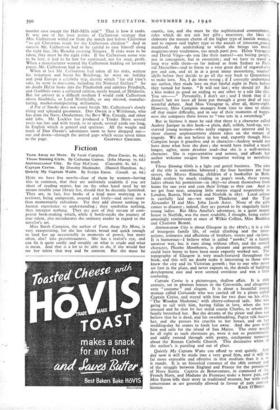The Bridge Boss
PERHAPS it is right to respect the average biography more than the average novel. The average man cannot cheat so easily when he writes about himself. His falsities and evasions are all bits of himself and may instruct one as much as what he supposes and confesses. He cannot quite so easily travesty another life as a poor novelist can travesty a ruling novel. So Mr. Culbertson is both average and peculiar. Since no two dandelions are the same, Mr. Culbertson's autobiography is attractive and instruc- tive because he is a peculiar dandelion of a twentieth-century type. His father was an American mining engineer, who developed oil in the Caucasus and married a Russian aristocrat, and invested all his wealth in Russian stocks and lost it all when the Bolsheviks started a new kind of type life with the revolution. The mining engineer was big and Puritan, the Russian mother grand and human. They are rather well described. Their Ely was a minor rake-hell, a black sheep, clad, to borrow one of Max Beerbohm's remarks, rather more in sheep's clothing than he realises. Many young men find large-eyed girls. Many young men wet their feet in other men's revolutions, if there are revolutions about as there were when Mr. Culbertson was young in Russia before the Great War. Many young men mix girls and revolution. And when their fathers are well off, and there is an ever-existing rescue party behind them of dollars, pounds or roubles, many young men rake-hell about, changing from bit to bit of education, adding fragment to fragment of eccentricity, revolution, hoboing, drinking, pretending, loving and so on, in a nervous, but not very interested, hope of running into some reason for going on with life.
Mr. Culbertson, then, begins to get interesting as a type when he goes home to America and when his father loses all his money. There has been some talk here and there about Kant and Dostoievsky and Kropotkin, but they are sprinkled on the loaf like poppy seed, and quickly brushed off again. Mr. Culbertson had to make good. He was an able, an extremely able, card-player, he saw the likely success of contract bridge, he saw there was room for a bridge hero, and planned to be that hero. He went for the problem with the intuition and cunning of Hitler or Goebbels. He made Ely the Unknown into Ely the News, and finally staged the Culbertson-Lenz match in Nov York for the bridge dictatorship of the world. For the match A. P. brought heavy cables into the Culbertson apartment in the Chatham Hotel, and Western Union and Postal Telegraph set Up branches in the Culbertsons' spare room. "More words were printed on this match than on the Lindbergh flight or any
murder case except the Hall-Mills trial." That is how it ranks. It was one of the least points of Cu:bertson strategy that Mrs. Culbertson withd:ew from the match just before Christmas " to get Christmas ready for the Culbertson children." And in success Mr. Culbertson had to be careful to ease himself along the right line, like Blondin crossing Niagara. If risks were to be taken, they must be the right risks. If the Cu:bertson name was to be lent, it had to be lent for continued, not for snap,. profit. When a manufacturer wanted the Culbertson bidding on lavatory paper, Mr. Culbertson had to refuse.
When at last Mr. Culbertson had taken all his risks, written his testament and burnt his Reichstag, he went on holiday and paid Europe a celebrity trip, during which " for old time's sake, he went to museums, including the National Gallery." So no doubt Hitler looks into the Pinakothek and admires Friedrich, and Goebbels owns a collected edition, nicely bound, of Holderlin. But for artistry in a difficult medium I would rank Culbertson above Goebbels, or Lord Northcliffe, or any shrewd, manufac- turing, market-manipulating millionaire.
A Pot of Smoke does not count beside Mr. Culbertson's slowly rising and splendid gasometer. Dan Owain is a Welshman, who has done the Navy, Omdurman, the Bo-u- War, Canada, and other odd jobs. Mr. Lockley has produced a Trader Horn several years too late and with beard, so to speak, several yards too long, in English which is genteel and spurious. All the weight and truth of Dan Owain's adventures seem to have dropped out— out and down—through the dotted gaps which occur seven times































 Previous page
Previous page